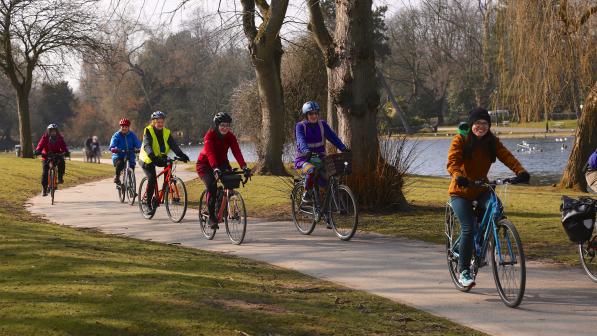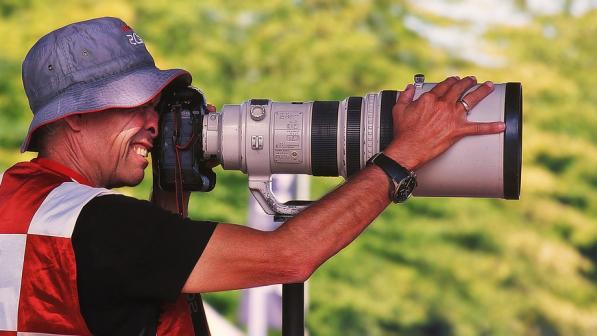Press watchdog needs to show its teeth over misleading photos

The press watchdog, Independent Press Standards Organisation (IPSO) has not gone far enough in censuring a national newspaper for publishing unfounded allegations about cyclists breaking exercise rules during lockdown, Cycling UK says.
The Independent Press Standards Organisation upheld a complaint against Mirror.co.uk, ruling that an article published on April 4 2020, headlined “Cyclists ignore UK coronavirus lockdown rules as they ride together in the sun", was in breach of the Editors' Code of Practice. The article used photographs of cyclists, taken using a telephoto lens, which gave the misleading impression that the cyclists were riding closer together than they really were.
However, the press standards body has failed to investigate two further complaints from Cycling UK on the same subject. The national cycling charity submitted its own complaints to IPSO in April concerning the Mirror article and a similar one in Mail Online. These were dismissed, as was a subsequent appeal, because the watchdog claimed that the complaints did not fall into an area covered by the Editors’ Code of Practice. Duncan Dollimore, Cycling UK's head of campaigns, then wrote directly to IPSO’s chief executive. "The effect and implications of using a telescopic lens would have been known to the photographer," he said in his letter. "It has been used to bolster an inaccurate story and dangerous narrative." The organisation still refused to investigate.
The complaint that was upheld came from Glen Tarman, a cyclist who appeared in the photographs. IPSO's decision shows that Cycling UK’s case now also deserves to be answered, Dollimore says.
“Despite having received an independent complaint from one of the cyclists pictured in the Daily Mirror article, raising similar concerns, IPSO claimed that Cycling UK had no connection to the cyclists, was not in a position to know if any of them had set out to cycle as a group, and was speculating that a telephoto lens had been used.
“It refused to investigate or ask any questions, but was eventually forced by Mr Tarman to consider the evidence and account of someone who was there.
“Two newspapers relied on manipulated images to unfairly and inaccurately suggest that people cycling for their permitted and recommended exercise during the coronavirus crisis were behaving irresponsibly, and potentially either illegally or contrary to guidance – all of which was incorrect.
“Having now been forced to investigate and rule on Mr Tarman’s complaint against the Mirror, IPSO should finally show some teeth, and belatedly investigate Cycling UK’s complaints against both the Mirror and Mail Online.”
Having now been forced to investigate and rule on Mr Tarman’s complaint against the Mirror, IPSO should finally show some teeth, and belatedly investigate Cycling UK’s complaints against both the Mirror and Mail Online
Duncan Dollimore, head of campaigns, Cycling UK
In his complaint, Mr Tarman said that when he was photographed he was cycling for exercise with one other member of his household, as permitted by government guidelines at the time. He went on to say he did not know or engage with any of the other cyclists pictured and always maintained a two-metre distance from them. His complaint also stated that road markings visible in the photo proved that the cyclists were not as close together as the article implied.
In response, the Mirror denied that the photograph in question was misleading, and showed other photographs which it claimed demonstrated this. However, IPSO upheld the complaint, saying in its ruling: “The published photograph added to the impression that the cyclists were ignoring the ‘rules’ as the front-on image made the cyclists appear close together.” The press watchdog has ordered the Mirror to add a correction to the online article and publish a separate correction.
“I felt it was time to make a stand," Mr Tarman told Cycling UK. "Distorted images and articles that do not stand up to scrutiny create a climate in which cyclists are abused, threatened and put in danger on the road.
"The article directly led to a lot of online abuse and calls for law-abiding citizens like me who cycle, to be attacked and even killed. This is really not OK."
Distorted images and articles that do not stand up to scrutiny create a climate in which cyclists are abused, threatened and put in danger on the road
Glen Tarman, cyclist unfairly portrayed in Mirror article
"The ruling I won from the press regulator shows that the media have been putting out inaccurate information and distorted images of cyclists during the pandemic. Misleading coverage of cyclists by newspapers, including using distorted images, must stop.
Such trickery and abuse of standards has consequences. It divides a nation when we need to be united and makes a community of ordinary citizens – cyclists – a target when we should all be encouraging lawful, safe exercise by all including on bikes."
His victory "vindicates Cycling UK", he said. "That the body's complaint on the very same images was not taken forward when a simple online search of a map would show it was valid was simply wrong."
Cycling UK will be writing to IPSO again to urge it to investigate the complaints that were dismissed.
Main image licensed under Creative Commons





